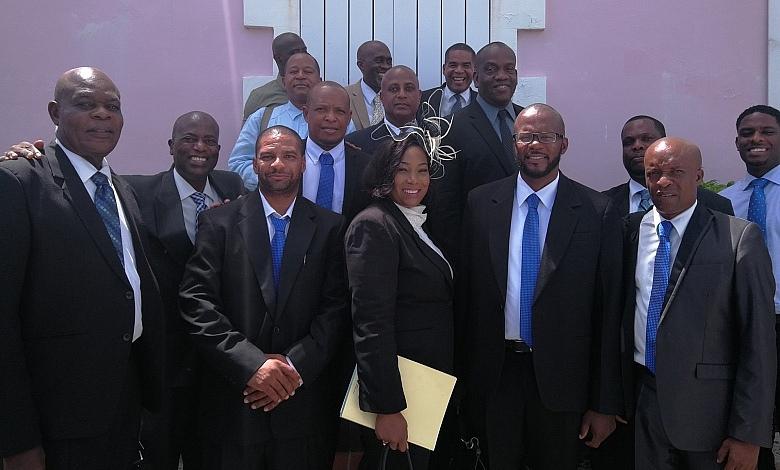United Workers Party (UWP)

The United Workers Party (UWP) was officially founded in 1988, emerging during a significant political transformation in Dominica. A group of professionals, business leaders, and social activists formed the party to offer an alternative vision to the then-dominant political entities. The UWP’s founding mission centered on economic development, transparency, good governance, and grassroots empowerment, appealing directly to working-class citizens, farmers, small business owners, and the Dominican diaspora.
Led by its first political leader, Edison James, the UWP quickly positioned itself as a formidable opposition party with a pro-business stance, promising fiscal responsibility and inclusive economic growth. This progressive, development-focused platform resonated with segments of the population disillusioned with the existing parties, allowing the UWP to gain traction within a few short years of its establishment.
Electoral Performance and Key Milestones
The UWP’s breakthrough came during the 1990 General Elections, when it won six parliamentary seats and established itself as the official opposition. The party’s momentum peaked in 1995, winning a majority and forming the government under Prime Minister Edison James. The 1995-2000 UWP administration focused heavily on infrastructure development, particularly road improvement, airport expansion, and agriculture sector revitalization, aiming to stimulate economic growth.
Despite losing the 2000 elections to the Dominica Labour Party (DLP), the UWP maintained a consistent presence in parliament. Although it has experienced internal division over the years, its core message of economic empowerment, accountability, and fair governance has kept it relevant, particularly among rural voters, professionals, and sections of the Dominican diaspora.
Leadership and Key Figures
Several influential personalities have shaped the UWP’s development and public image over the decades.
- Edison Chenfil James – Founding leader and Prime Minister from 1995 to 2000, James remains a respected elder statesman within the party.
- Ron Green – Served as party leader and parliamentary representative, maintaining the UWP’s focus on rural development and environmental sustainability.
- Lennox Irving Linton – As leader from 2013 to 2022, Linton focused on anti-corruption advocacy, often highlighting transparency and electoral reform as central themes.
- Dr. Thomson Fontaine – Elected party leader in 2022, Fontaine brings economic expertise, emphasizing sustainable development, economic diversification, and democratic governance.
The UWP’s leadership has reflected a blend of seasoned political veterans and professional technocrats, combining economic policy insight with grassroots political advocacy.
Core Ideology and Policy Focus
At its core, the United Workers Party has consistently advocated for:
- Economic Diversification: Moving beyond traditional sectors like banana industry and tourism, focusing instead on agriculture modernization, renewable energy, technology investment, and entrepreneurship support.
- Transparency and Accountability: The UWP has been a persistent critic of government corruption, calling for greater oversight, strengthened anti-corruption mechanisms, and reform of the electoral system to ensure free and fair elections.
- Diaspora Inclusion: The party recognizes the economic and intellectual potential of Dominica’s large diaspora community and advocates for increased diaspora involvement in national development projects.
- Social Programs: Policies aimed at improving healthcare, enhancing education access, and expanding youth training programs remain staples of UWP platforms.
Role in Electoral Reform Advocacy
Since the early 2000s, the UWP has been the loudest voice advocating for electoral reform, arguing that Dominica’s electoral system is outdated and vulnerable to manipulation. The party has repeatedly called for:
- Updated voter lists to remove ineligible or deceased individuals.
- Voter ID cards to enhance identity verification during elections.
- Fair access to state media for all political parties.
- Independent electoral commission oversight without political interference.
This pro-reform stance has shaped the party’s identity, rallying civil society organizations and parts of the business community around its cause.
Engagement with the Public and Diaspora
The UWP maintains a strong presence on social media, using platforms like Facebook, X (formerly Twitter), and YouTube to broadcast party updates, campaign messages, and policy discussions. It also holds regular diaspora town halls, recognizing Dominicans’ political and economic influence abroad, particularly in the United States, Canada, and the United Kingdom.
In addition to traditional campaign rallies, the UWP regularly engages in community outreach programs, including village visits, economic development consultations, and youth-focused events to build grassroots loyalty and connect directly with voters.
Recent Developments and Current Outlook
Under Dr. Thomson Fontaine’s leadership, the UWP has been working to modernize its platform and rebuild internal cohesion. Fontaine’s leadership combines economic vision with political reform, seeking to position the UWP as the party of financial competence and good governance.
With the next general election anticipated very soon, the UWP’s strategy includes focusing on:
- Economic Recovery Post-Hurricane Maria
- Climate Resilience Projects
- Youth Job Creation Programs
- Agricultural Revival through technology and value-added processing
- Continued push for electoral reform
The UWP’s future hinges on its ability to attract younger voters, expand its support base beyond traditional strongholds, and present a united front capable of challenging the long-dominant Dominica Labour Party.




